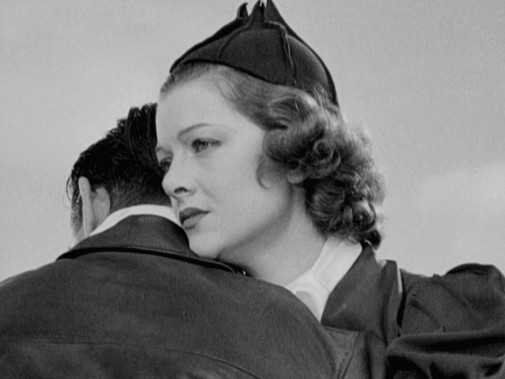
Myrna Loy's an interesting case as far as the Oscars are concerned. She was a great star, a charming performer with a magnetic screen presence, and even appeared in more than one Best Picture winner. It's easy to imagine that such a person would be a shoo-in for an Academy Award nomination at some point in their career, but Loy was never that lucky. Of the many times she came close, we're here to discuss Test Pilot. This Victor Fleming-directed romantic drama nabbed three nods back in 1938. Among them was a Best Picture citation, though no love was shown to the movie's actors…
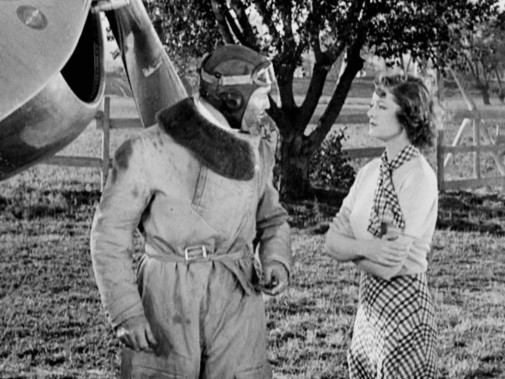
Inspired by Lieutenant Commander Frank Wead's real-life experiences, Test Pilot tells the story of an aviator named Jim Lane, played with dashing charisma by Clark Gable. One day, during a reckless flight, he's forced to land (or crash) on a Kansas farm where he crosses paths with Myrna Loy's Ann "Thursday" Barton. After spending what seems to be less than 24 hours together, they fall in love like all attractive movie stars in Old Hollywood romances do. Still, the road to a happy ending isn't a straight line, not when Howard Hawks is among the screenwriters.
Despite their obvious attraction, Jim and Ann are stubborn people, unwilling to show weakness, not even to the person they claim to love. At first, he leaves her and, to show her paramour that her heart's unbroken, she gets engaged to a local sweetheart. Of course, such obstinance won't be long-lived and they eventually fall into matrimony with each other. Still, at a story beat when many movies would end, Test Pilot's only getting started. After the wedding, Ann finds that the life of a test pilot's wife is one of constant anxiety.
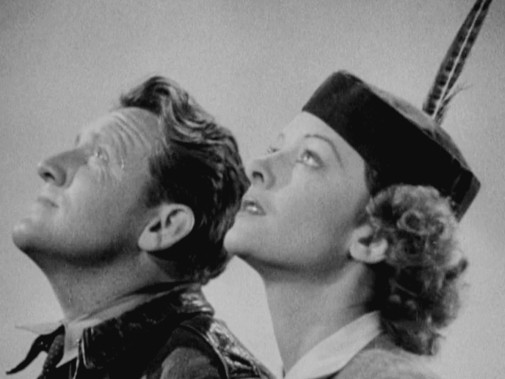
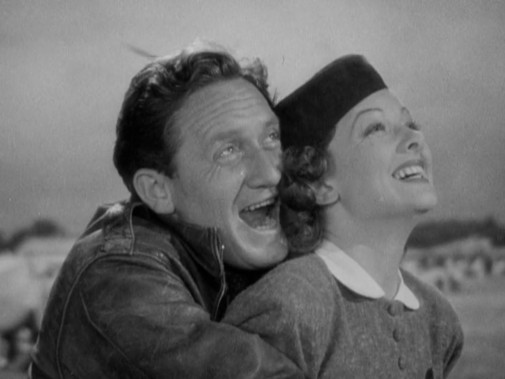
Many times, we're made to watch her looking on her beloved as he flies up in the sky inside experimental deathtraps that often claim lives as they crash and burn. In this, she's joined by Jim's best friend, a mechanic named Gunner who's played by Spencer Tracy with his usual stoic fashion. Bound by their love for a reckless man, the two form an odd bond made of shared stress and debilitating fear. I won't spoil how the movie ends, but Death does show its face a couple of times, and Loy' Ann is inevitably driven to copious tears.
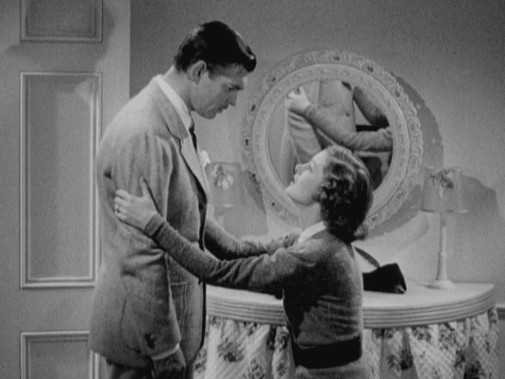
On paper, the role of Ann isn't very complex. She falls in love and she is afraid for her romantic interest, a simple arc easily illustrated without a lot of tonal shifting. Mostly, the actress has to look beautiful and in love, able to cry at important moments. The genius of Loy is how she finds variation inside the role, building an interesting character out of a simplistic archetype. She finds humanity in the stock part of the bereaved long-suffering wife of a "great man".
Mostly, the actress does this by playing every scene at two levels, what Ann feels and what Ann shows. It's a smart strategy that gives added meaning to the text she's given. There's always a palimpsestic relationship between what goes on inside the character's head and what Loy outwardly performs.
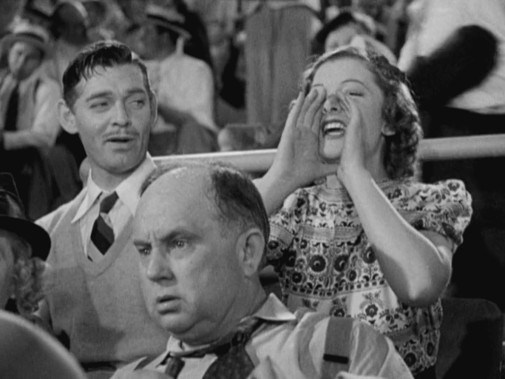
Nose in the air, defiant and confident, Loy walks into the picture as if she owns the whole world. There's an arresting abrasiveness to her manner, a touch of sourness that helps us better appreciate the instant attraction between our romantic leads. In Loy's hands, Ann's a woman who's unwilling to show vulnerability, be it weeping sadness or the preciousness of blooming love. She likes Gable's Jim but she won't let him see just how much. It takes a shocking experience, first flying adventure, for her mask to slip and for the actress to surrender completely to elation.
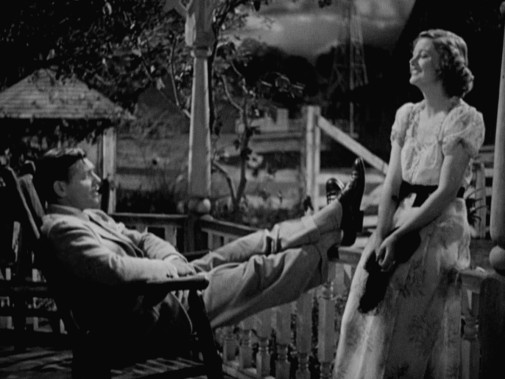
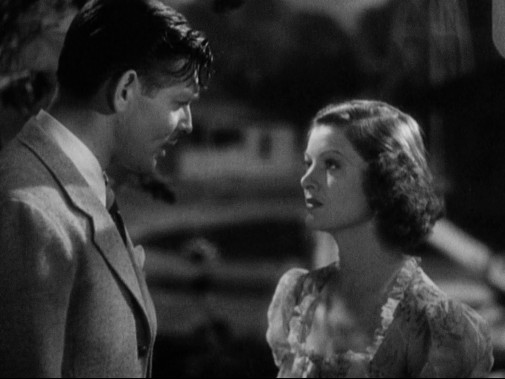
Later on, when Jim's telling Ann of their impending separation, Loy plays the moment with obstinance, hiding this woman's heart like an animal hides their soft belly from incoming danger. We understand the character's deep feelings by how visibly she fights against them, almost as if Ann's trying to convince herself of the things she's telling Jim. Still, we can always see what's hiding behind the filigreed wall of her indifference. Ann doesn't want him to leave but she'll not give Jim the pleasure of witnessing how her heart breaks for him.
Acting these contradictions could be an effortful task, but Loy makes it look easy, further intertwining suggestions of forbidden Pre-Code-esque naughtiness and jolly humor between Ann's performative rejection.
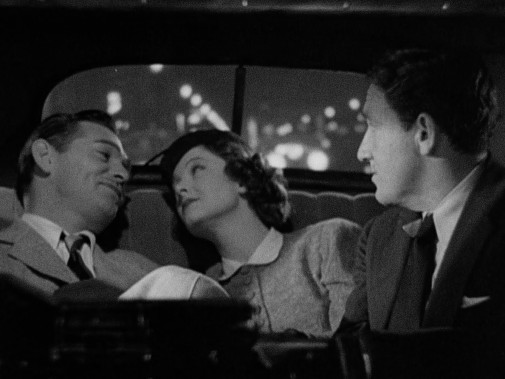
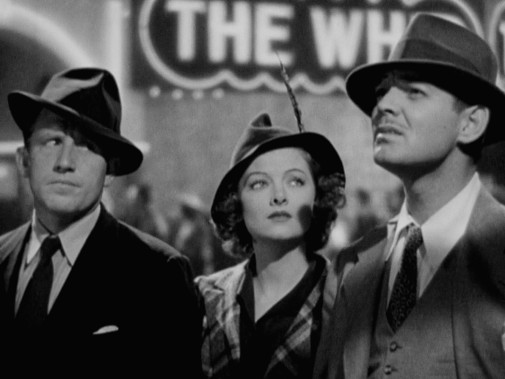
With the advent of marriage and the picture's second act, Loy gets less to do, but her transition from romantic comedy to sincere melodrama is seamless. From the start, there's a cloud of sadness at the edges of her marital glee, an apprehension that only manifests completely when Gable's away and Loy can share scenes with Tracy alone. Sometimes, the movie even finds little morsels of quiet comradery going on between wife and best friend when the hero's in the scene. There's a great moment when Loy hugs Gable and looks over his shoulder towards Tracy. In a simple exchange of loaded looks, a wave of sorrow washes over the film, her fear mirrored in his subtle reaction while the man they both love remains oblivious.
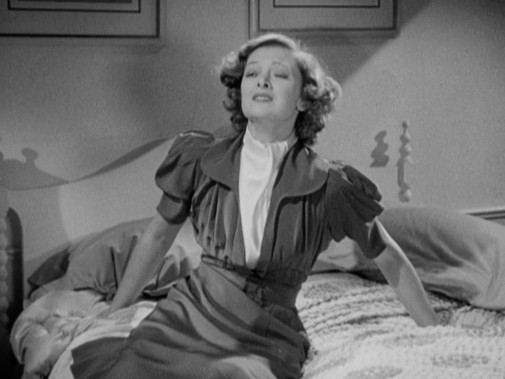
In Test Pilot, Myrna Loy's performance's a crescendo of dramatic tones disrupting light-hearted romance and her final passages are stupendous thanks to that built-up of emotion. Her devastation feels earned, tearfully explosive but organic nonetheless. Unfortunately, that wasn't enough to convince AMPAS, who chose five other actresses over her. In the Academy's defense, their selection is impressive, even without Loy. The nominees were Fay Bainter in White Banners, Bette Davis in Jezebel, Norma Shearer in Marie Antoinette, Margaret Sullavan in Three Comrades, and Wendy Hiller in Pygmalion. Davis won her second statue that year, while Loy would be Oscarless until she received an honorary trophy in 1991.
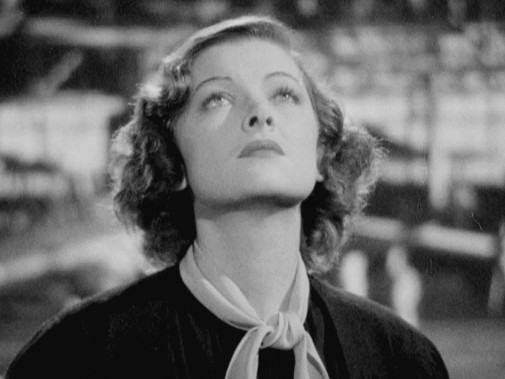
If you're a fan of Myrna Loy, for what performances do you think she should have earned Oscar nominations?